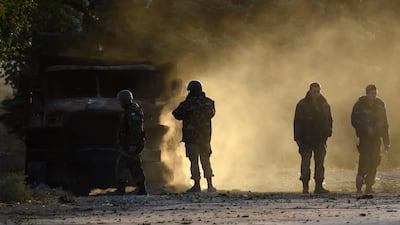SPARTAK, Ukraine // Clashes broke out on Sunday outside the main rebel-held city in eastern Ukraine, throwing the freshly forged ceasefire between government troops and Russian-backed separatists into further doubt.
One woman was killed by shelling in the port of Mariupol, just hours after Russian President Vladimir Putin and Ukrainian counterpart Petro Poroshenko had agreed in a phone call that the truce was holding.
At least two houses blazed in the rural village of Spartak, which lies just north of Donetsk and adjacent to the airport, after they were hit by fire.
A man whose house was struck by a shell said rebels had fired from a spot nearby, which appeared to have provoked a retaliatory attack from Ukrainian government troops.
This pattern has been regularly observed in the nearly five-month-long military confrontation.
A group of rebel fighters in the village danced and drank Sunday morning in celebration after what they said was a successful assault on a Ukrainian military encampment in the vicinity.
One said their group had captured eight government troops, although none of these captives could be seen.
The fighter said the ceasefire was not being respected by either side.
“There was mortar shelling around 20 minutes ago here in Spartak,” he said. “There is no ceasefire for anyone.”
The truce signed on Friday appeared to be holding for much of the following day, but was shattered late Saturday by shelling on the outskirts of Mariupol.
The volunteer pro-government Azov Battalion said their positions were also hit by Grad rockets, but did not give details.
Mariupol is located on the coast of the Sea of Azov, 115 kilometres south of Donetsk. Rebels recently opened a new front on the coast, leading to fears that they were trying to secure a land corridor between Russia and the Crimean Peninsula, which Russia annexed in March.
Amnesty International on Sunday condemned all those engaged in the grinding conflict that according to UN estimates has claimed at least 2,600 civilian lives and forced hundreds of thousands out of their homes.
“All sides in this conflict have shown disregard for civilian lives and are blatantly violating their international obligations,” Amnesty’s secretary general Salil Shetty said.
Blasts powerful enough to be heard in downtown Donetsk could be heard coming from the direction of the airport early in the morning. The terminal, which has now been rendered little more than a burnt-out husk, has been under the control of government troops since May and has come under unremitting attacks since then.
A rebel statement said Ukrainian forces fired on their positions in six locations on Saturday, including near the Donetsk airport, and several rebels were killed.
In nearby Spartak, resident Anastasia Ivanusenko, who has moved to Donetsk to escape the most intense fighting, learnt her house had been destroyed on Sunday as she was coming to pick up some basic items for her child.
“I have a little baby and we are temporarily living in a dormitory. We wanted to get the stroller, some warm clothes for the child,” she said, quietly sobbing on a bench across the road from her burning home. “There was no way to get into the house.”
Ukraine, Russia, the Kremlin-backed separatists and the Organisation for Security and Cooperation in Europe signed the ceasefire in Minsk on Friday in an effort to end the bloodshed. The negotiators agreed on the withdrawal of all heavy weaponry, the release of all prisoners and the delivery of humanitarian aid to devastated cities in eastern Ukraine.
The 12-point agreement, published on Sunday by the OSCE, also obliges Kiev to give greater powers to the separatist Donetsk and Luhansk regions and calls for local elections to be held in those Russian-speaking regions. A previous 10-day ceasefire, which each side repeatedly accused the other of violating, yielded few results at the negotiating table.
Ukrainian president Petro Poroshenko’s office on Saturday said he and Russian President Vladimir Putin had spoken by telephone and discussed steps “for giving the ceasefire a stable character”. But, it said, both leaders assessed the ceasefire as having been “fulfilled as a whole”.
Mr Poroshenko’s aide said on Sunday that Kiev had reached agreement during the last week’s Nato summit in Wales on the provision of weapons and military advisers from five member states of the alliance.
“At the Nato summit agreements were reached on the provision of military advisers and supplies of modern armaments from the United States, France, Italy, Poland and Norway,” the aide, Yuri Lytsenko, said.
He gave no further details and it was not immediately possible to confirm his statement.
* Associated Press with additional reporting by Reuters

